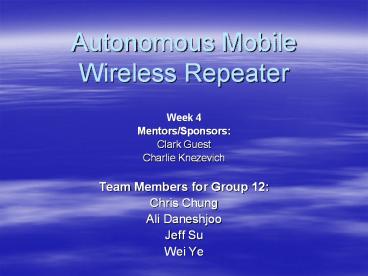Autonomous Mobile Wireless Repeater - PowerPoint PPT Presentation
1 / 9
Title:
Autonomous Mobile Wireless Repeater
Description:
Contacted the builder of our RC plane and set up a time to meet ... 2 axes control: NAV-A (aileron) or NAV-R (rudder) and ALT-E (elevator) or ALT-T (throttle) ... – PowerPoint PPT presentation
Number of Views:304
Avg rating:3.0/5.0
Title: Autonomous Mobile Wireless Repeater
1
Autonomous Mobile Wireless Repeater
- Week 4
- Mentors/Sponsors
- Clark Guest
- Charlie Knezevich
- Team Members for Group 12
- Chris Chung
- Ali Daneshjoo
- Jeff Su
- Wei Ye
2
Agenda
- Gantt Chart
- Tasks Performed
- Wireless Relay Technical Specification
- Plane Specification
- PicoPilot Technical Specification
- Summary
3
Gantt Chart
4
Tasks Performed
- Determined the dimension and weight of our box
of added parts (i.e. Relay GPS, Auto Pilot,
Battery Charger and Voltage Regulator Circuit
Boards) - Contacted the builder of our RC plane and set up
a time to meet with him and make sure his design
meets our requirements - Contacted Iowa Thin Film manufacturer to discuss
wing mounted solar cells - Decided on which autopilot version to use in
order to be able to control throttle, and
altitude.
5
Wireless Relay Technical Specification
- Repeater - A network device used to regenerate or
replicate a signal. Repeaters are used in
transmission systems to regenerate analog or
digital signals distorted by transmission loss.
Analog repeaters frequently can only amplify the
signal while digital repeaters can reconstruct a
signal to near its original quality. - Chosen product information
- Product Name TRENDnet TEW-430APB
- Modes Wireless Bridge/Repeater
- Wireless Standards 802.11g backwards compatible
with 802.11b - Range 50-100 meters indoor, 100-300 meters
outdoor - Power Consumption 5Vdc/1.2A
- Dimensions 4.9x3.4x1.6 (no antenna)
- Weight 0.26 lb/118 g
- Frequency Range 2.412-2.484 GHz
6
Plane Specification
- Determined exact requirements for payload
capacity of RC plane - Plane must carry box with
- Dimensions 8 x 5 x 5.5 (length required for
housing of relay plus antenna) - Weight 1 lb. or approximately 450 grams
7
Voltage Regulator Circuit
Design of voltage regulator to provide 5V/1.2A to
power the wireless relay
8
PicoPilot Technical Specification
PicoPilot NAT
Very small size 1" x 2" x 0.5" ( 2 PCBs ) Very
low weight 1.0 oz ( 2 PCBs wire harness )
Plug-n-Fly no software setup, no calibration 2
axes control NAV-A (aileron) or NAV-R (rudder)
and ALT-E (elevator) or ALT-T (throttle)
Altitude hold uses a SMT barometric sensor for
altitude sample and hold /-1 ft accuracy Roll
attitude control (-A) uses the latest generation
MEMS sensors no external wing leveler required
Pitch attitude control (-E) uses a SMT
barometric sensor for vertical speed control Low
cost 1050
9
Summary / Future Plans
- Order parts and supplies
- Speak with builder of custom RC plane
- Speak with PicoPilot manufacturer
- Preliminary build of solar cells and power
circuit - Continue documentation






























